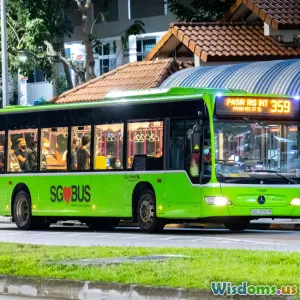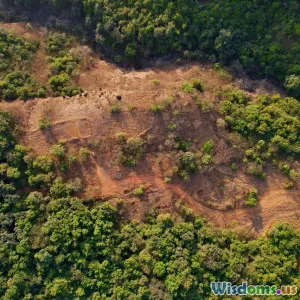
Exclusive Inside Look at London’s Zero Waste Street Pilot
7 min read An in-depth exploration of London’s pioneering zero waste street pilot, showcasing its impact, challenges, and inspiring the city’s sustainable future. (0 Reviews)
Exclusive Inside Look at London’s Zero Waste Street Pilot
Introduction
On a bustling London street, where everyday life flows endlessly amidst cafés, shops, and commuters, an ambitious experiment is quietly unfolding. This pilot project is no ordinary environmental scheme—it’s London's first zero waste street pilot, a bold initiative aiming to revolutionize urban waste management by eliminating landfill-bound rubbish entirely. But what does zero waste mean in the daily flow of a city street, and how is London navigating this challenge?
In this article, we take an exclusive deep dive into the zero waste street pilot to uncover the innovative approaches, community dynamics, and measurable impact that could redefine how metropolitan areas manage their waste footprint.
Understanding the Zero Waste Street Pilot Concept
Zero waste isn't simply about throwing less trash away; it embodies a systemic shift towards waste prevention, reuse, and resource circularity. The London zero waste street pilot targets a microcosm of the city—an entire street—demonstrating that localized, tailored interventions can accumulate to substantial environmental benefits.
Why a Street?
Choosing a single street allows the team to:
- Measure accurately before and after waste volumes
- Engage directly with local businesses and residents
- Tailor infrastructure to specific needs
- Pilot innovative technologies and behavioral nudges
The chosen street offers a diverse mix of commercial and residential properties, making the pilot results representative of typical urban environments.
Innovative Strategies Deployed
Waste Segregation Infrastructure
To enable effective resource sorting, the pilot introduced a suite of clearly labeled, accessible waste stations designed collaboratively with behavioral scientists. Color-coded bins cater to recyclables like plastics, metals, paper, alongside organic waste and general trash. Notably, the bins include smart sensors that record fill levels and usage patterns, feeding data back for continuous improvement.
Community Engagement and Education
A zero waste initiative thrives only with community buy-in. Pilot coordinators worked with local residents, shop owners, and street vendors via workshops, informational flyers, and interactive apps.
- Workshops covered composting, reducing single-use packaging, and repair culture.
- Digital platforms provided real-time street-wide waste stats encouraging friendly competition.
Sarah Jenkins, a local café owner, shared, "The workshops opened our eyes to how small shifts, like switching to reusable cups, make a visible difference. Customers have responded positively too."
Collaboration with Waste Collection Services
Innovations extended to how waste was collected and processed:
- Separate, frequent pickups for organic and recyclable material enhanced quality and reduced contamination.
- Partnerships with recycling facilities ensured material re-entered supply chains rather than ending in incineration.
This systemic coordination is vital for zero waste to move beyond a slogan into practicable action.
Measurable Impacts and Data Insights
Within six months, the street pilot reported impressive results:
- A 68% reduction in landfill waste volume.
- Organic waste diversion increased by 72%, subsequently used for local composting projects.
- Over 85% of plastic waste was recycled successfully, significantly higher than the London average of 43%.
Further, the pilot’s data exposed behavioral insights—peak trash generation times aligned with local business hours, guiding tailored waste collection schedules.
Challenges and Lessons Learned
No pioneering project is without hurdles:
- Initial resistance was observed among some residents skeptical about the new waste separation demands.
- Seasonal fluctuations caused variations in organic waste quantities, requiring adaptive strategies.
- Costs associated with sensor-equipped bins and increased collection frequency posed funding challenges.
However, the pilot’s iterative approach allowed swift adaptations. For example, adding more community champions reduced skepticism, and flexible contracts helped manage budget issues.
The Broader Implications for London and Beyond
The success of the zero waste street pilot has resonated with London's city planners and environmental authorities. The pilot provides a replicable blueprint:
- Prioritizing community voice in designing waste solutions.
- Leveraging real-time data for operational excellence.
- Creating measurable targets with transparent reporting.
Beyond London, this initiative has inspired urban sustainability projects globally, especially where high-density populations struggle with waste management. Cities from Singapore to Barcelona are monitoring London’s pilot for scalable lessons.
How Individuals Can Take Inspiration and Action
The pilot’s core takeaway for readers is empowerment—individual and collective choices at a local level can fuel broader change.
- Adopt waste segregation practices at home and workplaces.
- Support businesses that prioritize sustainability.
- Engage with or start local environmental initiatives.
- Advocate for municipal policies encouraging circular economy principles.
The street’s transformation proves that with targeted effort and collaboration, zero waste is an achievable horizon.
Conclusion
London’s zero waste street pilot exemplifies a pioneering approach merging technology, social science, and environmental stewardship in a tangible urban setting. Beyond statistics and infrastructure, it stands as a powerful testament to community resilience and innovation driving sustainability.
As cities face increasing environmental pressures, London's model signals a future where refuse is reduced to resources, redefining urban life’s footprint. For those looking to understand or enact meaningful environmental change, this pilot offers not just a glimpse into what's possible—but a call to action.
Join the conversation on sustainable urban living by sharing this article. Every step towards zero waste counts!
Rate the Post
User Reviews
Popular Posts




















